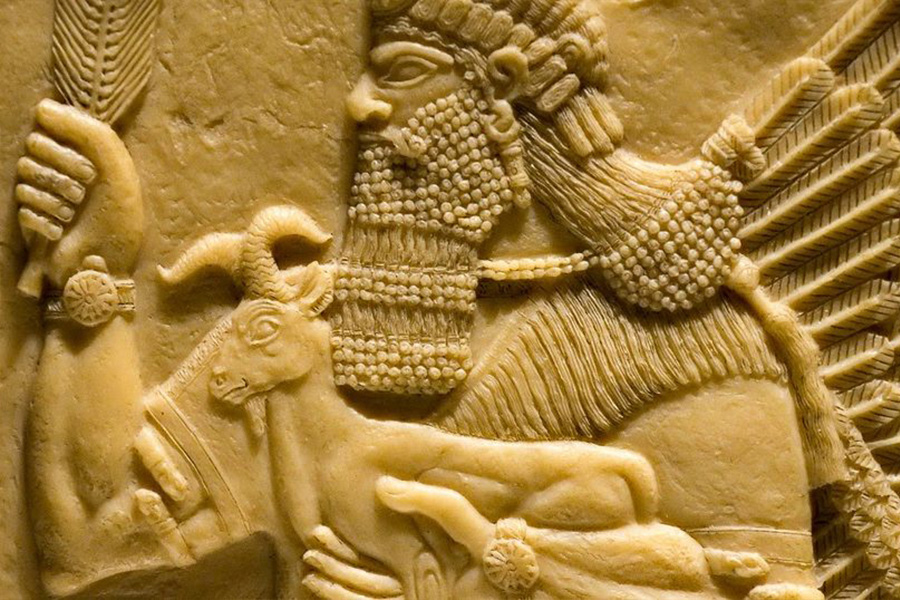The word azan (𐤀𐤆𐤍) means “ear” meaning the organ of hearing and equilibrium in vertebrates, consisting of an external ear that gathers sound vibrations.
The Paleo-Hebrew language or the original language of the Ābarayam is one spoken with an emphasis on the rauakh (breath, wind, spirit). With the language of the Ābarayam, each letter has a meaning and a number associated with it that adds meaning to each word they’re used with. Below you will be able to learn more about the letter in Ancient Hebrew, Yiddish Hebrew, Greek, and much more.
Letter Meanings
| Letter | Meaning |
|---|---|
| 𐤀 (a) – ah | Ox, strength, leader Prefix: Turns word into first-person |
| 𐤆 (z) – za | weapon, cut off, sickle, harvest, food, feed |
| 𐤍 (n) – na | offspring, seed, fish, heir, kingdom, continue, perpetuate Suffix: forming nouns denoting one with a certain characteristic. Suffix: forming names of chemical elements. |
| Ābarayat Number | |
| Hebrew Gematria | |
| English Gematria | |
| Simple Gematria |
Based on the meaning of the letters the word could be defined as:
Definitions for 𐤀𐤆𐤍 / azan
| Language | Word | Transliteration | Pronunciation | Definition |
|---|---|---|---|---|
| Ābarayat | 𐤀𐤆𐤍 | azan | aw-zan | an ear |
| English | ear | ear | eer | the organ of hearing and equilibrium in vertebrates, consisting of an external ear that gathers sound vibrations. |
| Hebrew | אֹזֶן | ozen | o’-zen | an ear |
| Arabic | أذن | udhin | ood-hawn | ear, leave |
| Greek | ὠτίον | otion | o-tee’-on | an ear |
Images for 𐤀𐤆𐤍 / azan


Definitions for 𐤀𐤆𐤍𐤉 / azanay
When adding the 𐤉 (yad) to the end of a word, it creates a possessive of the original word. It can either signify “my…” or identify a member of a nation. For example, 𐤏𐤁𐤓 (Ābar) is the progenitor, but 𐤏𐤁𐤓𐤉 (Ābaray) is the singular descendant of him also known as a Hebrew.
| Language | Word | Transliteration | Pronunciation | Definition |
|---|---|---|---|---|
| Ābarayat | 𐤀𐤆𐤍𐤉 | azanay | aw-za-nay | “my hearing” |
| English | hearing | hearing | heer-ing | the faculty or sense by which sound is perceived. |
| Hebrew | אָזְנִי | Ozniy | oz-nee’ | “my hearing”, |
| Arabic | اذان | ezan | eh-zan | ears |
| Greek | ἀκούω | akouó | ak-oo’-o | to hear, listen |
Images for 𐤀𐤆𐤍𐤉 / azanay


Definitions for 𐤀𐤆𐤍𐤉𐤌 / azanayam
When adding the 𐤌 (mayam) after the 𐤉 (yad) to the end of a word, it creates a plural of the original word. It can identify multiple members of a nation. For example, 𐤏𐤁𐤓 (Ābar) is the progenitor, but 𐤏𐤁𐤓𐤉𐤌 (Ābarayam) are the plural descendants of him also known as Hebrews.
| Language | Word | Transliteration | Pronunciation | Definition |
|---|---|---|---|---|
| Ābarayat | 𐤀𐤆𐤍𐤉𐤌 | azanayam | aw-zana-yawm’ | ears |
| English | ears | ears | eers | the organs of hearing and equilibrium in vertebrates, consisting of external ears that gathers sound vibrations |
| Hebrew | אֹזֶןיָּם | Ozniym | oz-nee-yawm’ | ears |
| Arabic | اذان | ezan | eh-zan | ears |
| Greek | ὠτίον | otion | o-tee’-on | an ear |
Images for 𐤀𐤆𐤍𐤉𐤌 / azanayam


Definitions for /
When adding the 𐤕 (tau) after the 𐤉 (yad) to the end of a word, it creates a plural of the original word. It identifies the language or a sign of a nation’s existence. For example, 𐤏𐤁𐤓 (Ābar) is the progenitor, but 𐤏𐤁𐤓𐤉𐤕 (Ābarayat) is the language of him also known as Paleo-Hebrew language.
| Language | Word | Transliteration | Pronunciation | Definition |
|---|---|---|---|---|
| Ābarayat | ||||
| English | ||||
| Hebrew | ||||
| Arabic | ||||
| Greek |
Images for /


Classification
You can continue your studies of the words by viewing Strong’s entries for:



